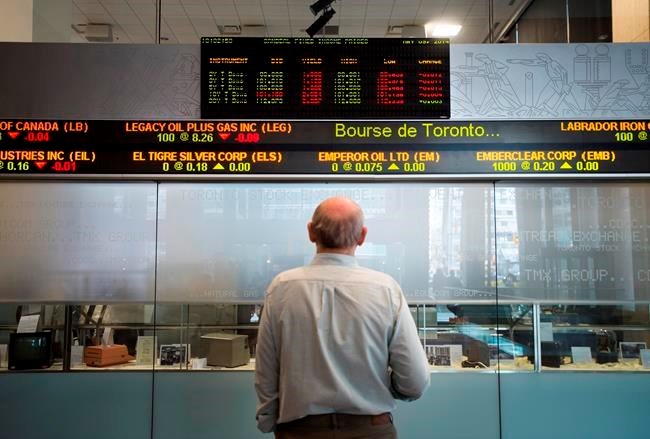TORONTO — North American stock markets were on edge again Thursday, plunging amid new concerns about the spreading of novel coronavirus and uncertainty over the upcoming U.S. presidential election.
"There's clearly still a lot of uneasiness happening in the broader marketplace," said Mike Archibald, vice-president and portfolio manager with AGF Investments Inc.
California declared a state of emergency after a COVID-19 related death and the number of infections doubled overnight in New York. And then Sen. Elizabeth Warren dropped out of the race to become Democratic presidential nominee in an expected boost to rival Sen. Bernie Sanders.
The U.S. 10-year treasury yield dropped to a new low under the one per cent psychological level for investors.
"Until we can get back above one sustainably I think you're going to see a lot of nervousness in this broader marketplace," he said in an interview.
Investor unease has produced a preference for safety with dividend-paying stocks and low-beta stocks, government bonds, gold and defensive sectors such as utilities and REITs.
Telecommunications is typically among the defensive sectors that outperform others but the government's move Thursday to force them to cut wireless rates by 25 per cent caused their shares to sink, including Rogers Communications Inc., which fell 2.4 per cent.
"We're going to be in this period of volatility until we get a little bit more clarity on when are we going to get to peak virus and to be clear that's not going to happen any time soon in North America," said Archibald.
The move by the U.S. and Canadian central banks to cut interest rates by half a percentage point this week temporarily dampened concerns but that was a one-day phenomenon, he said.
The S&P/TSX composite index closed down 225.54 points or 1.3 per cent at 16,553.99.
In New York, the three markets fell by more than three per cent. The Dow Jones industrial average was down 969.58 points or 3.65 per cent at 26,121.28. The S&P 500 index was down 106.18 points or 3.5 per cent at 3,023.94, while the Nasdaq composite was down 279.49 points or 3.1 per cent at 8,738.60.
Nine of the 11 sectors of the TSX were lower, led by consumer discretionary, energy, health care and industrials.
Shares of Spin Master Corp. fell 39.3 per cent to push down the discretionary sector after the Toronto toymaker warned sales will fall this year due in part to supply chain and other disruptions resulting from the new coronavirus outbreak.
Energy dropped with Husky Energy Inc. and Crescent Point Energy Corp. losing 6.3 and 5.7 per cent, respectively, on weaker energy prices.
Crude oil prices fell ahead of OPEC announcing Friday whether it will cut output by 1.5 million barrels per day to offset the impact of the virus which is reducing crude demand.
The April crude contract was down 88 cents at US$45.90 per barrel and the April natural gas contract was down 5.5 cents at US$1.77 per mmBTU.
The heavyweight financials sector lost more than two per cent with all Canadian banks falling amid weaker bond yields and an expected compression of margins.
Materials and consumer staples were higher as investors sought safety. Agnico Eagle Mines Ltd. was up 4.5 per cent as gold prices increased to just below a seven-year high.
The April gold contract was up US$25 at US$1,668.00 an ounce and the May copper contract was down 1.3 cents at US$2.57 a pound.
Archibald doesn't believe Friday's jobs reports will have any impact on markets because the data won't include any impact from the virus.
The Canadian dollar traded at a nine month low, averaging 74.54 cents US compared with an average of 74.67 cents US on Wednesday.
"With respect to a lack of projects getting done, pipelines being delayed, rail strikes happening and now punitive pricing penalties on the large telcos, the Canadian economy is moving closer and closer to the potential for a recession if these types of things keep happening," he said.
"In that particular environment you don't want to be anywhere near the Canadian dollar."
This report by The Canadian Press was first published March 5, 2020.
Companies in this story: (TSX:AEM, TSX:HSE, TSX:CPG, TSX:TOY, TSX:GSPTSE, TSX:CADUSD=X)
Ross Marowits, The Canadian Press
Note to readers: This is a corrected story. A previous version said copper was down 1.3 of a cent.



